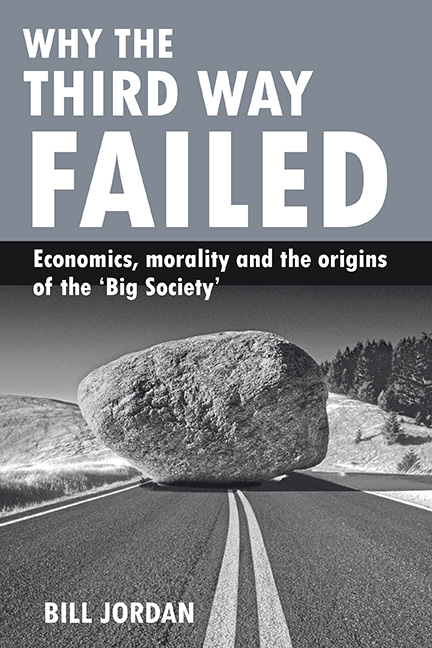nine - Conclusions
Published online by Cambridge University Press: 01 September 2022
Summary
The Third Way can be represented as the latest in a long line of attempts to regulate capitalism in line with some version of morality. It came into being as a response to 15 years of neo-liberal dominance in the affluent Anglophone countries, and in the IMF and World Bank (the Washington Consensus). While European countries remained loyal to Social Democratic and Christian Democratic political traditions and institutional settlements in the 1990s, Third Way ideas have since gradually become more influential in Europe, and especially in the post-communist new accession countries of the European Union (EU), in the first decade of the new century. Meanwhile, other responses to globalisation under free markets emerged in Asia (Gough, 2004) and Latin America (Gott, 2005), in the first case as export-led industrial strategies to complement the finance-based economies of the US and UK, and in the second as reactions against the exploitative reliance of both these types of regime on raw materials from the developing world.
Capitalism needs to be regulated if human social units are to be able to flourish, and people allowed to improve their quality of life (Polanyi, 1944); it is now clear that the future of the planet depends on environmental regulation. But capitalism constantly adapts and changes in response to a new regulatory environment, and sets new challenges to regimes trying to implement their various ethical principles. It constantly takes new shapes and transforms itself, breaking out of institutional constraints and destroying systems of social conservation.
The Third Way was a response to the subversion of welfare states by globalisation in the 1980s. It argued that these economic forces could be turned to the advantage of populations, and channelled to ethically justifiable ends, through new types of contractual regulation which went with the flow of market dynamics, but allowed individuals the opportunities and choices to take control of their lives. It rejected an approach to public policy which gave priority to equality of outcomes and to security, in favour of one which increased options for people, conceived as self-responsible and self-developmental.
The extent to which this approach came to permeate the thinking of even the continent thought to be most resistant to it can be judged from the shift in discourses in EU policy documents in the first decade of the century.
- Type
- Chapter
- Information
- Why the Third Way FailedEconomics, Morality and the Origins of the 'Big Society', pp. 191 - 204Publisher: Bristol University PressPrint publication year: 2010



